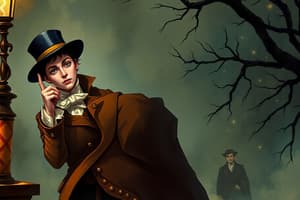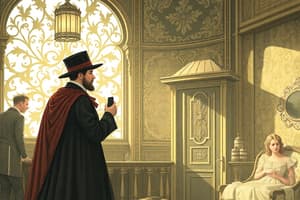Podcast
Questions and Answers
What is the primary way Dickens criticizes the Victorian view of the poor?
What is the primary way Dickens criticizes the Victorian view of the poor?
- By emphasizing the criminal nature of the poor
- By describing Oliver as virtuous, good, and innocent (correct)
- By portraying poor characters as inherently immoral
- By showing all poor characters as hardworking
How does Dickens depict the character of Noah?
How does Dickens depict the character of Noah?
- As hardworking and innocent
- As kind and honest
- As virtuous and good
- As embodying negative stereotypes (correct)
What does Dickens avoid when depicting the lower classes?
What does Dickens avoid when depicting the lower classes?
- Showing lower-class characters as criminal and immoral
- Describing many lower-class characters as good and hardworking (correct)
- Using characters that fit the Victorian stereotypes
- Satirizing the upper classes
Whose traits does Noah seem to have inherited?
Whose traits does Noah seem to have inherited?
What is notable about Dickens's portrayal of Oliver?
What is notable about Dickens's portrayal of Oliver?
What was one of Dickens' motivations for writing Oliver Twist?
What was one of Dickens' motivations for writing Oliver Twist?
Why do Oliver and Sowerberry travel to a squalid section of town?
Why do Oliver and Sowerberry travel to a squalid section of town?
What is notable about the shop fronts in the squalid neighborhood?
What is notable about the shop fronts in the squalid neighborhood?
What does the bereaved husband's wife starve to death due to?
What does the bereaved husband's wife starve to death due to?
What significant change occurs in Oliver's character after his attack on Noah?
What significant change occurs in Oliver's character after his attack on Noah?
What does Oliver's fit of rare anger symbolize?
What does Oliver's fit of rare anger symbolize?
Flashcards are hidden until you start studying
Study Notes
Critique of Victorian Era
- Dickens criticizes the common Victorian notion that the poor are inherently immoral, criminal, and filthy through his portrayal of Oliver Twist, a virtuous, good, and innocent character.
Challenging Stereotypes
- Dickens does not simply portray the lower classes as uniformly good, honest, and hardworking; instead, characters like Noah exhibit the same negative stereotypes Dickens satirizes, adding complexity to the narrative.
Social Commentary
- Dickens' motivation for writing Oliver Twist was to expose the deplorable living conditions of the lower classes and the social ills that came with it.
- The novel highlights the stark contrast between the wealthy and the poor, with the poor struggling to survive in squalid conditions.
Economic Realities
- The Industrial Revolution's economic expansion had left many behind, including those living in the impoverished neighborhoods depicted in the novel.
- The poverty and starvation faced by characters like the bereaved husband's wife are a result of the economic circumstances, not individual laziness.
Character Development
- Oliver Twist's attack on Noah marks a significant moment in his character development, revealing a capacity for anger and a growing sense of strength and power.
- Oliver's character is multidimensional, moving beyond his initial portrayal as sweet, docile, innocent, and naive.
Studying That Suits You
Use AI to generate personalized quizzes and flashcards to suit your learning preferences.




